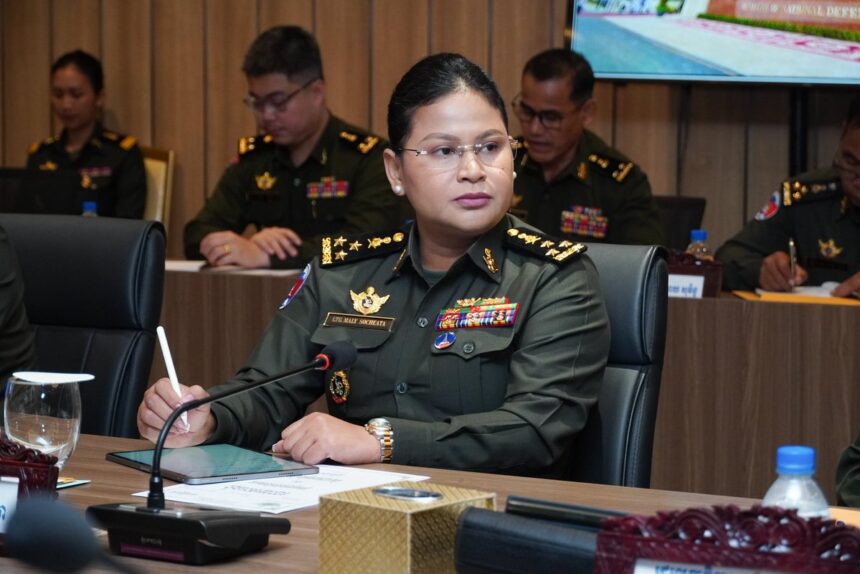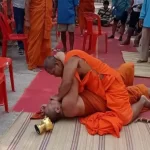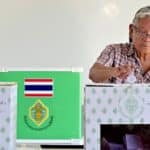BANGKOK – Cambodia’s recent claims that Thailand used chemical weapons near the Ta Moan Thom and Preah Vihear temples have drawn heavy skepticism after years of propaganda and disinformation from the Cambodian government.
Tensions are running high as these new allegations are debated by both governments and onlookers worldwide. Cambodian officials, led by the Ministry of National Defence and former Prime Minister Hun Sen, have pushed the claims despite a lack of solid proof, following a familiar script seen during Hun Sen’s years in power.
On July 27, 2025, Cambodia’s Ministry of National Defence spokesperson Lt. Gen. Maly Socheata accused Thailand of using “toxic military smokes and obscurants” in the disputed border areas. The Cambodian Human Rights Committee repeated the accusation and condemned Thailand’s supposed use of chemical agents.
The debate escalated when Hun Manet’s wife posted a Facebook photo of a plane trailing smoke, claiming it was evidence of a Thai aircraft spreading toxic chemicals. Thai officials and outside observers quickly pointed out that the picture showed a U.S. firefighting plane, not involved in the conflict.
Thailand’s Foreign Ministry called the allegations “groundless” and said they fit with past efforts by Cambodia to damage Thailand’s reputation. Thai military leaders added that Thailand does not use or develop chemical weapons, highlighting its obligations under the Chemical Weapons Convention and international law.
Independent analysts have found little to back up Cambodia’s claim. Users on X pointed out issues with the images Cambodia shared, saying they were wrongly labelled or unrelated. With no outside confirmation from neutral groups, most in the international community feel cautious about taking the claims at face value.
A Pattern of Disinformation Under Hun Sen
Doubt over these new claims comes from a long history of disinformation during Hun Sen’s almost 40 years in power. After passing the prime minister role to his son Hun Manet in 2023, Hun Sen kept control as Senate President and head of the Cambodian People’s Party. He still holds major influence over politics and the media.
Hun Sen’s government worked hard to control the flow of information, often silencing media that criticized it, especially during election periods. In 2023, authorities shut down news outlets like Voice of Democracy and The Cambodia Daily, calling them “propaganda,” while state-backed channels flourished.
Reports from the Cambodian Journalists Alliance show 35 cases of harassment against 72 journalists in 2020, a sign of ongoing pressure on the free press.
Social media has played a major role in the spread of misleading information. Hun Sen has used platforms like Facebook to stir nationalist feelings, often ignoring the facts.
In 2003, false claims that a Thai actress said Angkor Wat belonged to Thailand sparked riots and the burning of the Thai Embassy in Phnom Penh. As recently as June 2025, Cambodian officials circulated old photos with strong captions, raising tensions with Thailand and forcing local leaders to warn against the spread of misinformation.
The current border conflict has brought similar strategies. Cambodian leaders have been accused of taking advantage of low digital literacy (only 32 per cent of Cambodians have basic digital skills) to spread unproven stories, such as the chemical weapons claims, fuelling nationalism and distracting from domestic criticism.
Hun Manet’s Leadership and His Father’s Influence
Since becoming prime minister, Hun Manet has often operated in his father’s shadow. Hun Sen continues to play a leading role, especially during the border clashes, where he was seen in military gear managing operations via video and posting sharp messages online that blamed Thailand for the violence. Experts believe Hun Sen’s actions aim to boost his son’s image by encouraging national pride, as Hun Manet is still building his power base.
Hun Manet has tried to show a more diplomatic side, suggesting that international bodies like the International Court of Justice should help settle the dispute. However, his government still uses disinformation tactics similar to those of his father’s administration.
The chemical weapons story was pushed by state-friendly media and widely shared on social media, even without clear proof.
Countries in the region, along with the U.S. and China, have called for calm and restraint. Malaysian Prime Minister Anwar Ibrahim, as ASEAN’s chair, led talks that helped broker a ceasefire on July 28, 2025. Malaysian observer groups continue to monitor the agreement, but both Cambodia and Thailand accuse each other of breaking the truce.
The United Nations Security Council held an emergency meeting on July 25 due to worries about the fighting spreading. Cambodia’s request for UN intervention, labelling Thailand as the aggressor, hasn’t gained much support, given the questionable evidence.
Rising tensions have affected more than just the military situation. Over half a million Cambodians working in Thailand have reported increased hostility, with some facing violence and discrimination. Social media activity has made things worse, as viral posts have stirred anger in both countries.
Deep Roots and Political Moves in Cambodia
The argument over the border stretches back to colonial times, when France set the original boundaries. The International Court of Justice ruled in 1962 that Preah Vihear belongs to Cambodia, but disagreements over neighbouring land continue and often become political tools.
The latest round of fighting, triggered by a May 2025 incident that left a Cambodian soldier dead, has been made worse by personal rivalries, especially between Hun Sen and members of Thailand’s Shinawatra family.
Hun Sen’s release of a phone call with Thai Prime Minister Paetongtarn Shinawatra, in which she criticized her military, resulted in her suspension and led to political upheaval in Thailand. Many see this as a move by Hun Sen to disrupt Thai politics while boosting his son’s nationalist image.
Meanwhile, the current ceasefire remains fragile as the global community calls for honest dialogue and reliable information. Cambodia’s lack of proof for the chemical weapons claim has increased doubts about its motives. With Hun Sen’s history of using misinformation to keep his grip on power and Hun Manet’s desire to establish himself, the dispute remains tense and unpredictable.
ASEAN’s role in mediation, along with pressure from abroad, offers some hope for stopping further clashes. Still, old habits of spreading disinformation and stirring up nationalism make a lasting peace difficult. The Cambodia-Thailand border continues to stand as a symbol of both conflict and distrust.
Related News:
Thailand and Cambodia Agree to Unconditional Ceasefire














